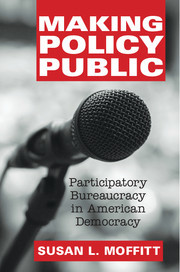Description
Making Policy Public
Participatory Bureaucracy in American Democracy
Author: Moffitt Susan L.
This book challenges the convention that government bureaucrats seek secrecy and demonstrates how participatory bureaucracy manages the tension between bureaucratic administration and democratic accountability.
Language: English
Subject for Making Policy Public:
Approximative price 32.87 €
In Print (Delivery period: 14 days).
Add to cart
Making Policy Public
Publication date: 09-2014
274 p. · 15.2x22.8 cm · Paperback
Publication date: 09-2014
274 p. · 15.2x22.8 cm · Paperback
Approximative price 65.00 €
In Print (Delivery period: 14 days).
Add to cart
Making Policy Public
Publication date: 09-2014
264 p. · 15.8x23.5 cm · Hardback
Publication date: 09-2014
264 p. · 15.8x23.5 cm · Hardback
Description
/li>Contents
/li>Biography
/li>
This book challenges the conventional wisdom that government bureaucrats inevitably seek secrecy and demonstrates how and when participatory bureaucracy manages the enduring tension between bureaucratic administration and democratic accountability. Looking closely at federal level public participation in pharmaceutical regulation and educational assessments within the context of the vast system of American federal advisory committees, this book demonstrates that participatory bureaucracy supports bureaucratic administration in ways consistent with democratic accountability when it focuses on complex tasks and engages diverse expertise. In these conditions, public participation can help produce better policy outcomes, such as safer prescription drugs. Instead of bureaucracy's opposite or alternative, public participation can work as its complement.
1. Portals of democracy in American bureaucracy; 2. Participatory bureaucracy in practice: implementing complex policy; 3. The private and bureaucratic roots of public participation: the development of American federal public committees; 4. Making educational performance public: reporting on the progress of education; 5. Private knowledge for public problems: regulating pharmaceutical information; 6. Setting the public agenda; 7. Deliberate participation; 8. The impact of public advice on bureaucratic administration; 9. Participatory bureaucracy in American democracy.
Susan L. Moffitt is the Mary Tefft and John Hazen White, Sr Assistant Professor of Political Science and Public Policy at Brown University. Before joining the faculty at Brown in the fall of 2009, she was a Fellow at the Center for American Political Studies and a Robert Wood Johnson Scholar of Health Policy Research at Harvard University. Her research program focuses on the development and use of knowledge in government agencies, with particular emphasis on the fields of K-12 education policy and pharmaceutical regulation. Moffitt's scholarship connects the study of institutional development with salient and enduring policy problems. Her first book, The Ordeal of Equality (co-authored with David K. Cohen), was published in 2009. Her work has appeared in the American Journal of Political Science, the Journal of Politics, the Journal of Law, Economics and Organization, the American Journal of Education, and numerous edited volumes. She holds a PhD and an MPP from the University of Michigan and a BA from the University of Rochester.
© 2024 LAVOISIER S.A.S.




